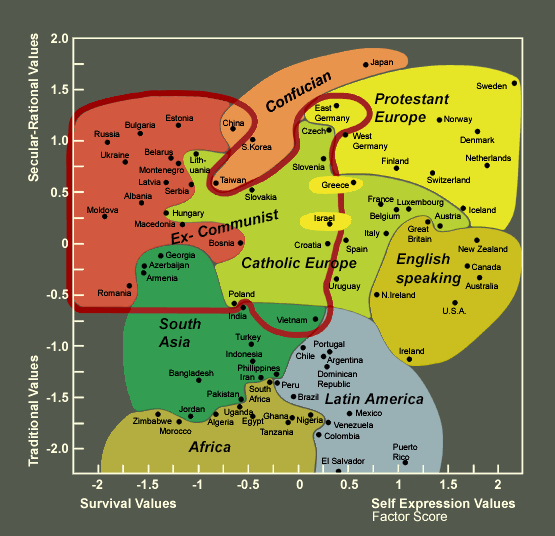I first posted this almost a year ago, after watching the author on CSPAN.
I've been thinking about his theory a lot lately, and I think it may help us understand the immigration issue that is currently running rampant through GD.
(I'm torn, myself, between both arguements)
Pay particular attention to the "map" that compares America's values to other countries. I've been watching this debate develop and how it's dividing Dems and Repugs alike. I flash on this map, and how it shows we are so very different from every other country, yet we have pieces of each deeply imbeded in our values.
review - is this crisis of values real?
http://www.democraticunderground.com/discuss/duboard.php?az=show_mesg&forum=104&topic_id=3744557&mesg_id=3744593Has America lost its traditional values? Many politicians and religious leaders believe so, as do the majority of Americans, based on public opinion polls taken over the past several years. But is this crisis of values real?
This book explores the moral terrain of America today, analyzing the widely held perception that the nation is in moral decline. It looks at the question from a variety of angles, examining traditional values, secular values, religious values, family values, economic values, and others. Using unique data from the World Values Surveys, the largest systematic attempt ever made to document attitudes, values, and beliefs around the world, this book systematically evaluates the perceived crisis of values by comparing America's values with those of over 60 other nations.
The results are surprising. The evidence shows overwhelmingly that America has not lost its traditional values, that the nation compares favorably with most other societies, and that the culture war is largely a myth.
The gap between reality and perception does not represent mass ignorance of the facts or an overblown moral panic, Baker contends. Rather, the widespread perception of a crisis of values is a real and legitimate interpretation of life in a society that is in the middle of a fundamental transformation and that contains growing cultural contradictions. Instead of posing a problem, the author argues, this crisis rhetoric serves the valuable social function of reminding us of what it means to be American. As such, it preserves the ideological foundation of the nation.
http://www.worldvaluessurvey.org/library/main_2.htmlMy Notes
I found it very interesting
Research shows we are not losing our values, we test the same now as we did 20-30 years ago.
Our values are a strange combination of Traditional and Self-expressive. This makes us the oddballs of the world. We are slowly becoming odder, moving more to self-expressive.

Link to World Values Survey site -
http://www.worldvaluessurvey.com/Why are we so different? in other countries, people are born into their countries values, in America, we are people who gathered together because of our shared values.
The conflict created within our society this internal clash between strong traditional and strong self-expressive values creates a conflict within us and results in Cognitive Dissidence. As we move more towards Self-expression, the more extreme a crisis we envision. This is why the extreme right is becoming more extreme, they are reacting to the paradox, it makes them uncomfortable.
Traditional Values does not equal Conservative Values
Rabid Right latched on to his book, but only for the traditionalist parts he says, hold up. You need to read this book with one eye open. The left eye
Embrace the Paradox
Q & A
Politics is estranged from the electorate dangerous and it worries him.
Our citizens are already there, & we are waiting for our leaders to join us
Why did Kerry lose and Bush win? Kerry promoted the Self-expression angle, Bush promoted the Traditional. Traditional trumped Self-expression (in this attitude of fear and uncertainty) . Media was a large part of this, emphasizing the black/white view of things.
Abortion when you ask the question : Is abortion murder 50% say yes, 50% say no. divided along dem/rebub lines, pretty much.
But when you divide the question into sub questions i.e.
Is Abortion acceptable when the pregnancy is a result of rape, is it acceptable when mothers life is in danger, is it acceptable when child will be born severely deformed, or when it will create great hardship for family, Is Abortion a matter of personal choice? 80% of Americans answer yes. Its how you frame the question, and media and politics knows this, uses it.
Seeing a trend towards Post Materialist values, we are becoming more concerned with quality of life than materialistic goals.
Voter numbers are so low because (darn missed that part) but as we move towards more Self-expression, more people will vote. He sees the numbers rising greatly in next several elections.
Israel is pretty far from us on values map.
What do we do? (as activates, citizens) Find the common ground in our conversations, bridge the divide in our personal contacts with others we think alike more than we know.
From Greater Democracy website
http://www.greaterdemocracy.org/archives/000330.htmlWayne Baker, author of the new book America's Crisis of Values, is quoted in a Detroit Free Press article as saying: "I believe that this culture war is a myth in this country... We think we're divided -- and we're really not."It's a question I've been pondering: If the United States is united, if Americans share the same core values of freedom, equality, justice, community, etc., why do we sense that we are deeply divided? Is it possible that the divisions we sense are not the ones we think? Is it possible that we are divided not by our values nor by our religious beliefs nor by our politics? Is it possible that the divisions we see (i.e., pro-choice vs. anti-abortion, fundamentalist vs. mainstream, science vs. religion, conservative vs. progressive, red state vs. blue state) are less divisions than they are symptoms of change?
More at link.
Discuss.
